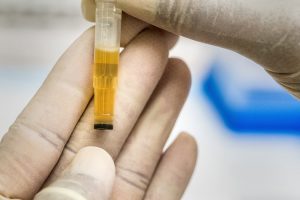Nitrofurantoin is a nitrofuran antibiotic used to treat bacterial infections in the lower urinary tract. Does Nitrofurantoin have sulfa? This article discusses Nitrofurantoin and sulfa medications and their compositions. Doctors commonly prescribe Nitrofurantoin as an effective treatment for UTIs caused by particular bacteria, such as Klebsiella, Enterobacter cystitis, E. coli, Enterococcus, and Staphylococcus aureus.
Antibiotics are categorized into different classes depending on their chemical structures, spectra of antibacterial activity, or mechanisms of action. Classification helps to understand the full range of antibiotic medications available and how they work. Some antibiotic classes include penicillin, nitrofurans, cephalosporins, tetracyclines, and fluoroquinolones.
What is Nitrofurantoin?
Nitrofurantoin is a commonly prescribed antibiotic that effectively treats infections in the lower urinary tract caused by infectious bacteria or parasites. If you have a urinary tract infection, your qualified healthcare provider will likely prescribe antibiotics to eliminate the disease. The Food and Drug Administration approves Nitrofurantoin in the US.
Nitrofurantoin is typically recommended for uncomplicated infections in the lower urinary tract. This antibiotic medication treats UTIs triggered by Klebsiella, Enterobacter cystitis, E. coli, Enterococcus, and Staphylococcus aureus. The way Nitrofurantoin works makes it quite a unique medication for treating UTIs.
When Nitrofurantoin is absorbed into the bloodstream, it is quickly filtered into the bladder’s urine. Once deposited in the bladder, nitrofurantoin fights and eliminates bacteria and parasites at the site of the infection.
Nitrofurantoin is a prescription antibiotic that must be used as a qualified healthcare provider instructs explicitly to avoid unwanted complications or side effects. Nitrofurantoin is available under the Macrodantin, Nitro Macro, and Macrobid brand names.
What is a sulfa medication?
A sulfa drug, or a sulfonamide, is a synthetic antibiotic containing the sulfanilamide molecular structure. These drugs were the first chemical substances systematically used to treat and prevent human bacterial infections. However, their use has diminished due to the availability of more effective and safer antibiotics and the emergence of drug resistance.
Sulfonamides work by inhibiting the production of folic acid in bacteria, a crucial step for DNA synthesis. Although they were once widely used, sulfa drugs are now primarily employed for treating urinary tract infections and preventing infections in burns. Additionally, they find application in the treatment of specific forms of malaria.
The discovery of the antimicrobial properties of sulfonamides dates back to 1932 when German bacteriologist Gerhard Domagk observed the impact of the red dye Prontosil on Streptococcus infections in mice.
French researchers later confirmed that the active agent in Prontosil was sulfanilamide, a product of the body’s metabolism of Prontosil. By the 1940s, sulfanilamide had become widely used.
During World War II, white sulfanilamide powders were standard first-aid kits for treating open wounds, and sulfanilamide tablets were taken to combat intestinal infections.
However, despite its relative safety, allergic reactions such as skin rashes, fever, nausea, vomiting, and even mental confusion were common. With the advent of less-toxic derivatives and the mass production of penicillin, the use of sulfanilamide declined.
Does Nitrofurantoin have sulfa?
Nitrofurantoin is an antibiotic in the nitrofurans class. Does Nitrofurantoin have sulfa? Nitrofurantoin does not contain sulfa or sulfanomide. It eliminates bacteria by altering their DNA material and inhibiting their reproduction ability, leading to their eventual death.
If you have a sulfa allergy, you can safely take Nitrofurantoin without concerns. It’s an antibiotic commonly used to treat urinary tract infections. Every patient’s health situation is unique, so it’s always best to consult your healthcare provider if you have any concerns or questions about medications.
How does Nitrofurantoin work?
Because of its mechanism of action, Nitrofurantoin is highly effective against bacteria in the lower urinary tract. The antibiotic is concentrated in the urine, where it can fight and eliminate the bacteria from the site of the infection.
Nitrofurantoin destroys bacterial DNA, as its reduced form is highly reactive. This happens because of the speedy reduction of Nitrofurantoin inside the bacterial cell by nitrofuran reductase or flavoproteins to reactive intermediates that attack pyruvate metabolism, respiration, DNA, ribosomal proteins, and other macromolecules within the cell.
Nitrofurantoin is highly effective against bacterial cells because it activates the drug more rapidly than mammalian cells. The specific action primarily responsible for its antimicrobial qualities is yet unknown.
The broad-spectrum nature of the antibiotic is likely responsible for the low rate of resistance development, as the medication attacks the most important processes of a bacteria cell.
Side effects of Nitrofurantoin and sulfa medications
As with any antibiotic medication, Nitrofurantoin can cause side effects. Typically, Nitrofurantoin side effects are mild and tolerable. However, in some rare cases, severe side effects may occur.
In addition, sulfonamide medications can cause mild and severe side effects. This is why it is vital to consult a healthcare expert before using antibiotics.
Consulting your doctor can save you from unwanted adverse effects or sulfa allergy that may cause adverse health conditions.
The following are some of the mild side effects of Nitrofurantoin:
- Nausea
- Diarrhea
- Loss of appetite
- Headaches
- Dizziness or sleepiness
- Changes in urine color
Some severe side effects may occur, including the following:
Lung Problems with symptoms like coughing up blood or mucus, shortness of breath, chest pain, or high temperature.
Liver or Gallbladder Disease: Pale stool, dark urine, yellowing of eyes or skin.
Blood Problems: Unexplained bruising, bleeding, sore throat, or fatigue.
Severe Headaches: Contact your doctor immediately if you experience severe headaches.
Sulfonamide’s mild side effects include the following:
- Itching
- Skin rash
- Increased sensitivity to sunlight
- Diarrhea
- Dizziness
- Headache
- Loss of appetite
- Nausea or vomiting
- Fatigue
- Minor rash
Nitrofurantoin and sulfonamide precautions
Nitrofurantoin is an effective antibiotic for UTI treatment, but it is vital to take some precautions to avoid unwanted health issues. Before using this medication, note the warnings.
Avoid Nitrofurantoin if you’re allergic or have the following health conditions:
Severe kidney issues
A history of jaundice
Liver problems
Inflammation of the lungs
Difficulty urinating
If you experience chills, cough, fever, chest pain, or trouble breathing, seek medical attention promptly.
Like every medication, there are precautions to note when using sulfa medications.
Sulfa antibiotics may cause blood problems, especially when taken for an extended time. Inform your doctor if your symptoms don’t ease or get worse after a few days of taking sulfonamides.
Sulfonamides may make you more sensitive to sunlight. Staying in the sun, even briefly, may cause rash, itching, redness, or other skin discoloration or severe sunburn. Since sulfa medications increase your photosensitivity, wear protective clothing or use sunscreen.
Kindly note that sulfonamide may cause dizziness, so you should avoid using heavy machinery, driving, or doing activities that require you to concentrate after taking it.
It would help to inform your doctor of your medications to avoid unwanted complications or interactions. In addition, if you’re allergic to medications containing sulfonamide, you should avoid using this drug.
Read also: Is Nitrofurantoin a Penicillin Antibiotic?
Frequently Asked Questions
Nitrofurantoin is an antibiotic class called nitrofurans. It is typically prescribed to treat UTIs caused by bacteria and infectious parasites in the lower urinary tract. Nitrofurantoin does not contain sulfonamide and is an excellent alternative for patients with a sulfite allergy.
If you’ve sulfa allergies, Nitrofurantoin is an effective alternative antibiotic to treat UTIs and other bacteria infections in the lower urinary system. The way Nitrofurantoin works makes it a commonly preferred treatment for UTIs. In addition, Nitrofurantoin is more tolerable as its side effects are usually mild. Sometimes, the side effects may be rare and severe, leading to unwanted health complications.
Sulfamethoxazole and trimethoprim are typically combined to treat bacterial infections, including UTIs, middle ear infections, bronchitis, shigellosis (bacillary dysentery), and traveler’s diarrhea.
Sulfa medications work by distorting and eliminating bacteria that cause several infections, even in the lower urinary tract. However, sulfa medications will not treat infections caused by viruses or other organisms like the common cold and flu.
Sulfamethoxazole and trimethoprim also prevent and treat jiroveci pneumonia or Pneumocystis carinii pneumonia (PCP), a severe kind of pneumonia. PCP typically occurs in patients with weakened immune systems, including transplant patients, cancer patients, and patients with acquired immune deficiency syndrome (AIDS).
Some antibiotics containing sulfonamides include the following:
- Bactrim
- Bactrim DS
- Septra
- Septra DS
- SMZ-TMP Pediatric
- Sulfatrim
- Sulfatrim Pediatric





